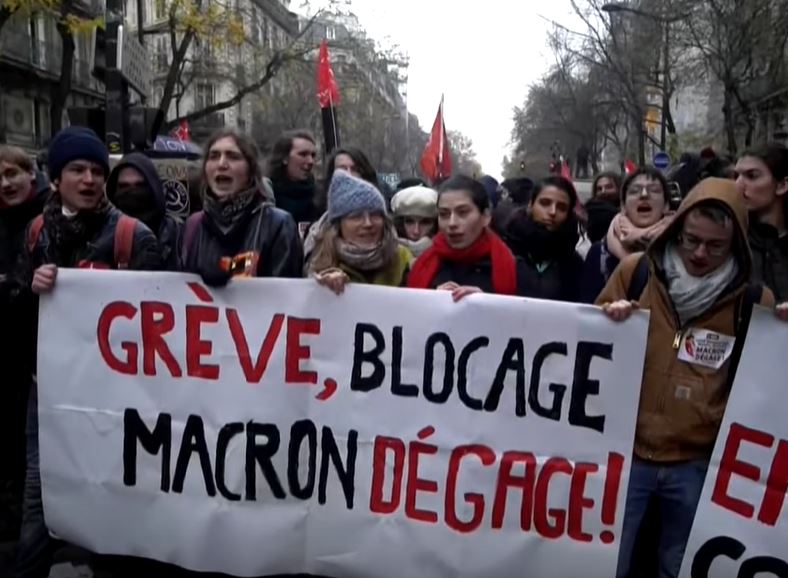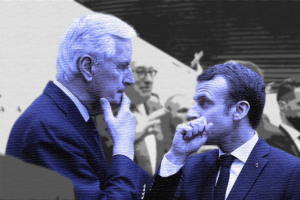Mass Strikes in France Shut Eiffel Tower, Trigger Clashes
An outpouring of anger is directed at the government’s plan to overhaul the retirement system. Demonstrators in Paris on Thursday. (YouTube screen grab)
Demonstrators in Paris on Thursday. (YouTube screen grab)
PARIS — The Eiffel Tower shut down, France’s high-speed trains stood still and tens of thousands of people marched through Paris and other cities Thursday in a massive and sometimes chaotic outpouring of anger at the government’s plan to overhaul the retirement system.
Small groups of masked activists smashed store windows, set fires and hurled flares on the sidelines of the otherwise peaceful Paris march, prompting volleys of tear gas from police in body armor.
Unions launched the open-ended, nationwide strikes Thursday over President Emmanuel Macron’s centerpiece reform in the biggest challenge to the centrist leader since the yellow vest movement against economic inequality erupted a year ago.
Opponents fear the changes to how and when workers can retire will threaten the hard-fought French way of life. Macron himself remained “calm and determined” to push it through, according to a top presidential official.
The Louvre Museum warned of strike disruptions, and subway stations across Paris shut their gates. Many visitors — including the U.S. energy secretary — canceled plans to travel to one of the world’s biggest tourist destinations.
Tourists discovered historic train stations standing empty, with about nine out of 10 of high-speed TGV trains canceled. Signs at Paris’ Orly Airport showed “canceled” notices, with authorities saying 20% of flights were grounded.
Some travelers showed support for the striking workers. Others complained about being embroiled in someone else’s fight.
“I had no idea about the strike happening, and I was waiting for two hours in the airport for the train to arrive and it didn’t arrive,” said vacationer Ian Crossen, from New York. “I feel a little bit frustrated. And I’ve spent a lot of money. I’ve spent money I didn’t need to, apparently.”
Vladimir Madeira, a Chilean tourist vacationing in Paris, said the strike has been “a nightmare.” He hadn’t heard about the protest until he arrived, and transportation disruptions foiled his plans to travel to Zurich.
Beneath the closed Eiffel Tower, tourists from Thailand, Canada and Spain echoed those sentiments.
Paris authorities barricaded the presidential palace and deployed 6,000 police officers as activists — many in yellow vests — gathered around the Gare de l’Est train station for the march.
Police ordered all businesses, cafes and restaurants in the area to close. Authorities banned protests in the more sensitive neighborhoods around the Champs-Elysees avenue, the presidential palace, Parliament and Notre Dame Cathedral.
Police carried out security checks of more than 9,000 people arriving for the demonstration and detained 71 even before it started. Embassies warned tourists to avoid the protest area.
The mood was impassioned in the crowd as it moved toward the Republique Plaza, with protesters waving red flares in the gray sky at the head of the crowd.
Health workers showed up to decry conditions in hospitals. Students pointed to recent student suicides and demanded government action. Environmentalists emphasized that climate justice and social justice are one and the same.
And young and old roundly condemned the new retirement plan, which they fear would take money out of their pockets and reduce the period of relaxation the French expect in the last decades of their lives.
Skirmishes broke out between police firing tear gas and protesters throwing flares at a protest in the western French city of Nantes, and thousands of red-vested union activists marched through cities from Marseille on the Mediterranean to Lille in the north.
Lacking public transportation, commuters used shared bikes or electric scooters despite near-freezing temperatures. Many people in the Paris region worked from home or took a day off to stay with their children, since 78% of teachers in the capital were on strike.
The big question is how long the strike will last. Transport Minister Elisabeth Borne said she expects the travel troubles to be just as bad on Friday, and unions said they will maintain the Paris subway system strike at least through Monday.
Joseph Kakou, who works an overnight security shift in western Paris, walked an hour to get to his home on the eastern side of town.
“It doesn’t please us to walk. It doesn’t please us to have to strike,” he said. “But we are obliged to, because we can’t work until 90 years old.”
The deeply unpopular Macron is expected to reveal the details of his retirement reform plan next week. The government has promised not to touch the official retirement age — 62, though earlier for certain physically demanding professions — but the plan will encourage some people to work longer.
To Macron, the retirement reform is central to his plan to transform France so it can compete globally in the 21st century. The government argues France’s 42 retirement systems need streamlining.
While Macron respects the right to strike, he “is convinced that the reform is needed, he is committed, that’s the project he presented the French in 2017” during his election campaign, the presidential official said. The official was not authorized to be publicly named.
___
Sylvie Corbet, Alex Turnbull, Nicolas Garriga, Mstyslav Chernov, Francois Mori in Paris contributed to this report.
Your support matters…Independent journalism is under threat and overshadowed by heavily funded mainstream media.
You can help level the playing field. Become a member.
Your tax-deductible contribution keeps us digging beneath the headlines to give you thought-provoking, investigative reporting and analysis that unearths what's really happening- without compromise.
Give today to support our courageous, independent journalists.








You need to be a supporter to comment.
There are currently no responses to this article.
Be the first to respond.